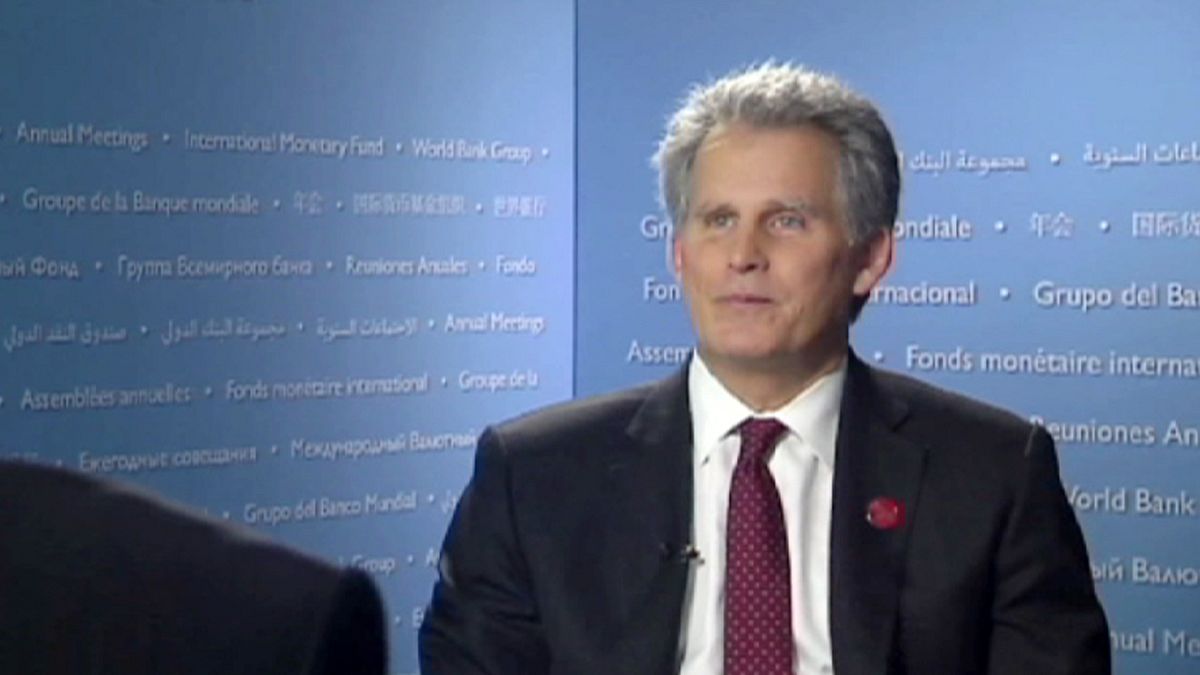Amid fears the global economic recovery could stall, some of the world’s top finance officials are expressing alarm at the eurozone’s weak growth.
At the annual gathering of the International Monetary Fund and the World Bank in the US capital Washington they called for action from European leaders to head off a regional recession that would set back the recovery.
IMF Managing Director Christine Lagarde said: “It is taking a very long time for the global economy to climb out of the hole dug by the Great Recession. We are stuck in a painful job crisis with 200 million people unemployed and looking for work around the globe. You know that if the unemployed people were to form a country it would be the 5th largest country in the world.”
The IMF and the World Bank believe one way to reduce that huge jobless population is through rebuilding infrastructure – things like roads, railways, sewers and power grids.
World Bank President Jim Yong Kim told delegates it would be a recipe for growth not just in Europe .. but also worldwide throught the global infrastructure facility: “This platform – called the GIF – will bring together institutional investors, development banks and public officials to tackle the infrastructure deficit in new and creative ways. Together they will create a robust pipeline of infrastructure projects for emerging markets and poor countries.”
The immediate problem is that weaker economies with high unemployment – like France and Italy – have big debt and deficits, which means they would have to borrow to pay for such infrastructure projects – something they are not allowed to do under EU rules.
Euronews Washington correspondent Stefan Grobe spoke with David Lipton, the First Deputy Managing Director of the IMF.
Stefan Grobe, euronews: “Mr. Lipton, the recovery in Europe hasn’t really stalled, but it is pretty weak. And now the IMF forecasts that in 2015 growth in Europe will almost be worse, as in Japan. Why is that so and what is the picture country by country?”
David Lipton: “Europe is dealing with the legacy of a very severe crisis and has now to deal with the inheritance of the debt, sovereign debt, household debt, corporate debt and the need to strengthen banks. Other countries have been recovering from crisis longer. The US had a crisis earlier and they have, frankly, dealt with it pretty well. Japan is taking steps to get over a crisis that began decades ago and has mired them in low growth. Europe has to find a way to avoid being stuck in low growth and low inflation. We have complained during these meetings that the world risks falling into a new mediocre, and that pertains to Europe too, because we think Europe can do better and we are a bit afraid that without the right policies Europe might do worse.”
euronews: “The IMF and others keep saying that structural reforms are key to enhancing productivity and competitiveness. Now, as a whole Europe has not done its homework otherwise the numbers would be better. So where are the areas where Europe must improve?
David Lipton: First, I think it is important to note that a number of countries have made important structural reform efforts, those tend to be the countries where there have been economic programs supported the troika – by the European Commission, the ECB and the IMF – but as a whole there is much more room for raising the growth rate of Europe by making structural changes that stick. Those include steps in the labor market in order to raise labor force participation, to make it easier for people to move around the economy, product and service market reforms to make the goods markets work better.”
euronews: “One key point in the discussions at the Annual Meetings is infrastructure – or the lack of investment therein. My question is: why are public investments so important and what are the political road blocks?”
David Lipton: “What we are saying is that this is the perfect time to be trying to address that problem, because the infrastructure that you would build would have two very important effects: In the long run it would raise the productivity and the growth of the country by providing an infrastructure that could serve the population, it could serve households, it could serve the needs of businesses. But, of course, in the short run the construction of the infrastructure is an added demand. And so this is one policy that both raises demand and supply.”
euronews: “And finally: We have seen over the last weeks and months a new level of anxiety and insecurity around the world. And the IMF has identified three major risks to the global economy, the Ebola virus, the situation in the Middle East and instability in Ukraine. To what extent are these crises threatening the global recovery?”
David Lipton: “It is a shame that on top of the economic challenges that countries face in strengthening the global economy, there are now geo-political risks that we are dealing with. So far, none of them have progressed to the point where we think that they are having a major effect on global growth, or European growth for that matter. But each has a certain amount of risk to them, in particular, the crisis in Russia and Ukraine. Right now the effects are to harm the economies of Russia and Ukraine, they have led to sanctions which further intensify the difficulties for Russia. In time it is possible that if these conflicts are not resolved, the effects could spread both in terms of a worsened confidence about the European economic space, potentially concerns about the reliability of energy supplies that Russia sends to Europe.”
